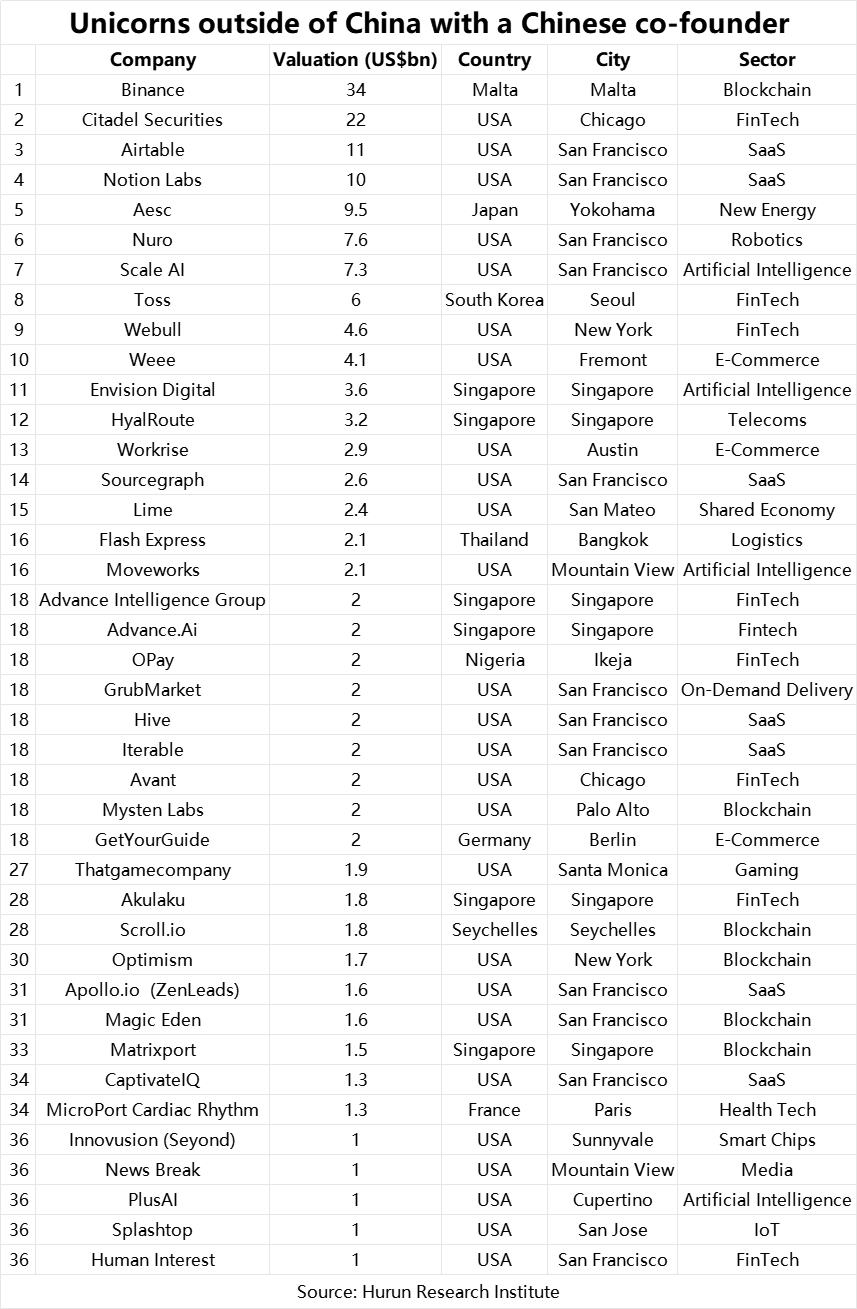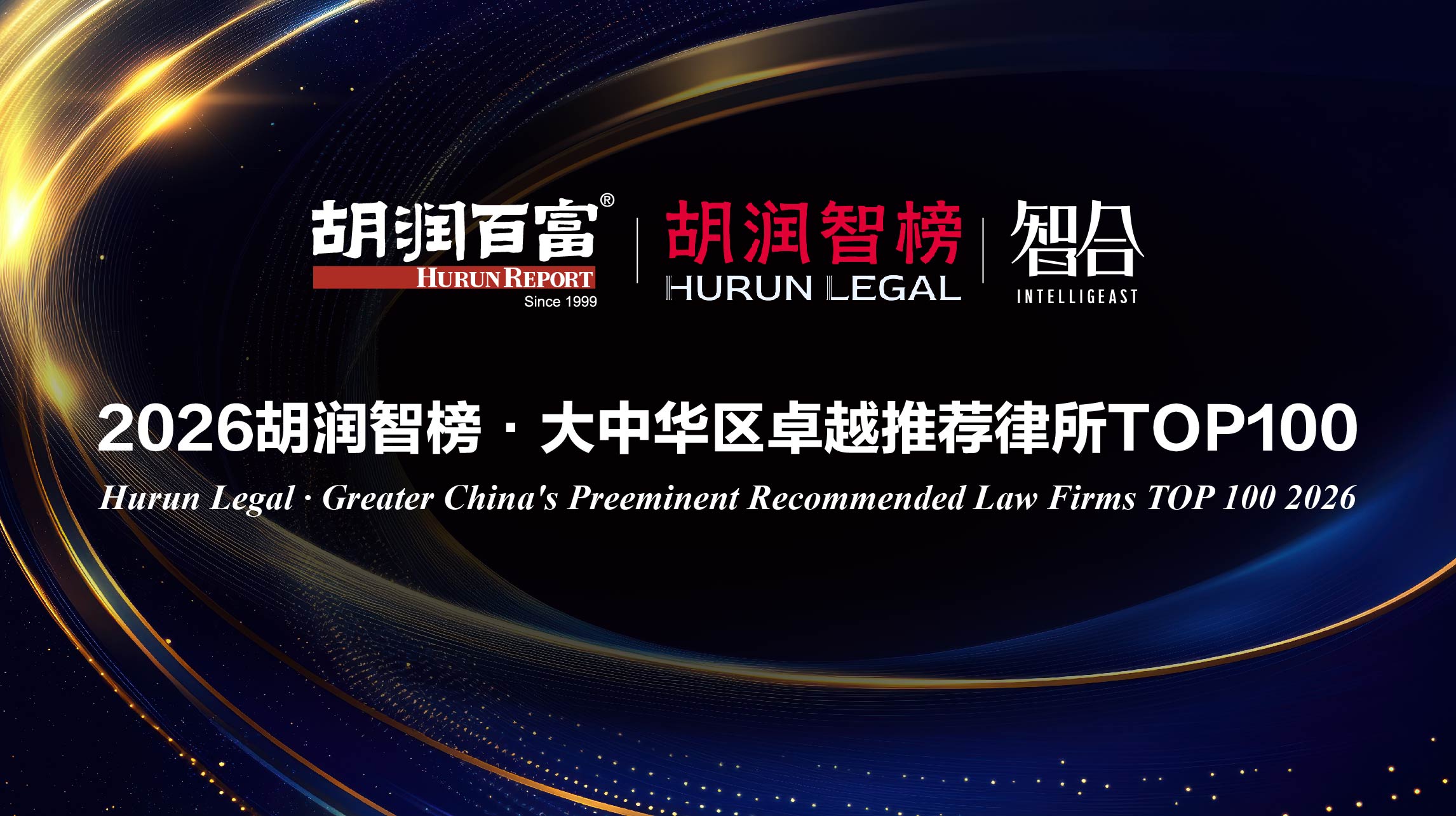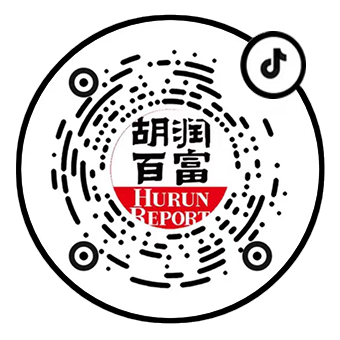Global Unicorn Index 2024
The Hurun Research Institute today released the Global Unicorn Index 2024, a ranking of the world’s start-ups founded in the 2000s, worth at least a billion dollars and not yet listed on a public exchange. The cut-off was 1 January 2024, with significant changes in valuation updated up to the date of release. Hurun Research has been tracking unicorns since 2017. This is the sixth year of the Globa
GLOBAL UNICORN INDEX 2024
IN SEARCH OF START-UPS FOUNDED AFTER 2000, WITH A VALUATION OF US$1BN AND NOT YET LISTED ON A PUBLIC EXCHANGE.
ONE NEW UNICORN MINTED EVERY TWO DAYS, LED BY USA WITH 70, CHINA WITH 56 AND ‘REST OF WORLD’ WITH 45. TOTAL 171 NEW UNICORNS IN WORLD IN PAST YEAR.
HURUN FINDS 1453 UNICORNS IN WORLD, NEW WORLD RECORD, UP 7% OR 92 UNICORNS
USA LED WITH 703 UNICORNS, UP 37, ACCOUNTING FOR 48% OF WORLD TOTAL.
CHINA SECOND WITH 340, UP 24.
INDIA THIRD WITH 67 UNICORNS, DOWN 1. UK 4TH WITH 53 UNICORNS, UP 4. EU COUNTRIES 109 UNICORNS, UP 5.
OPENAI SAW FASTEST VALUATION INCREASE, UP US$80BN TO THIRD PLACE WITH US$100BN.
SPACEX SECOND FASTEST, ADDING US$43BN TO US$180BN AND SECOND PLACE.
OTHER NEW ENTRANTS TO TOP 10: SYDNEY-BASED GRAPHIC DESIGN PLATFORM CANVA, DOUBLED VALUATION TO US$39BN, AND MALTA-BASED CRYPTO EXCHANGE BINANCE UP US$14BN TO US$34BN.
TIKTOK OWNER BYTEDANCE RETAINS TITLE OF WORLD’S MOST VALUABLE UNICORN, WORTH US$220BN, UP US$20BN, DESPITE THREAT OF US BAN.
SHANGHAI-BASED GAMING PLATFORM MIHOYO SHOOTS UP 91 PLACES TO 12TH WITH US$23BN VALUATION.
OTHERS THAT BROKE INTO TOP 50 INCLUDE JEFF BEZOS-FUNDED SPACE EXPLORATION COMPANY BLUE ORIGIN WORTH US$20BN, US-BASED DIGITAL MEDIA RED VENTURES, SEOUL-BASED CRYPTO EXCHANGE DUNAMU AND VIRGINIA-BASED SOCIAL MEDIA REDDIT. TOP 50 CUT-OFF US$10BN.
59 ‘SUPER UNICORNS’ WORTH US$10BN OR MORE, OF WHICH 3 WORTH US$100BN OR MORE.
FINTECH, AI, BLOCKCHAIN AND NEW ENERGY FASTEST-GROWING SECTORS THIS YEAR. OVERALL, FINTECH LED THE PACK WITH 185 UNICORNS, FOLLOWED BY SAAS WITH 139 AND AI WITH 115.
CHINA UNICORNS MAINLY AI, SEMICONDUCTORS AND NEW ENERGY. US SAAS, FINTECH AND AI, WHILST ‘REST OF WORLD’ FINTECH AND E-COMMERCE.
BIGGEST DROPS IN VALUE. CHINA'S FINTECH PLATFORM ANT GROUP, DOWN US$40BN, AND LOGISTICS PLATFORM CAINIAO, DOWN US$16.5BN.
RUSSIA FIRST UNICORN THIS YEAR, TAXI CALLING APP YANDEX.TAXI WORTH US$2.4BN. SAUDI ARABIA AND POLAND LARGEST ECONOMIES WITHOUT A UNICORN.
SAN FRANCISCO RETAINED WORLD’S UNICORN CAPITAL WITH 190 UNICORNS, FOLLOWED BY NEW YORK WITH 133 AND BEIJING WITH 78. SINGAPORE FASTEST-GROWING CITY IN WORLD FOR UNICORNS AFTER SAN FRANCISCO, ADDING 8, TO TOTAL OF 17. WITHIN CHINA, HEFEI FASTEST GROWING CITY FOR UNICORNS, FOLLOWED BY GUANGZHOU, HANGZHOU AND SUZHOU.
21 UNICORNS SPUN OUT OF STATE-OWNED COMPANIES, ALL FROM CHINA, LED BY GUANGZHOU-BASED EV MAKER AION WORTH US$14BN, WUHAN-BASED VOYAH WORTH US$4.3BN AND SHANGHAI-BASED IM MOTORS WORTH US$4.2BN.
18 CHINESE UNICORNS WENT IPO FROM LAST YEAR’S LIST, FAR AHEAD OF 5 FROM USA AND 6 FROM REST OF WORLD. 2.7% OF LAST YEAR’S LIST OR 37 UNICORNS ‘PROMOTED’ AFTER IPO OR ACQUISITION. MOST SUCCESSFUL IPO: INDONESIA-BASED J&T EXPRESS AND CHINA-BASED LUXURY EV MAKER LOTUS. BIGGEST US IPO DELIVERY PLATFORM INSTACART, NOW TRADING AT HALF ITS UNICORN VALUE.
42 ‘DEMOTED’ FROM UNICORN STATUS, WITH VALUATION DIPPING BELOW US$1BN, LED BY 21 FROM USA AND 11 FROM CHINA. LARGEST DROPOFFS WERE INDIA-BASED EDUCATION PLATFORM BYJU’S, VALUED LAST YEAR AT US$22BN AND US-BASED ECOMMERCE AGGREGATOR THRASIO, LAST YEAR VALUED AT US$10BN.
TIGER GLOBAL TAKES CROWN OF ‘WORLD’S MOST SUCCESSFUL UNICORN INVESTOR’ FROM SEQUOIA, FOLLOWED BY SOFTBANK. HONGSHAN OVERTOOK FORMER MOTHER SHIP SEQUOIA TO THIRD SPOT.
AVERAGE UNICORN AGE 10 YEARS. AVERAGE FOUNDER 45YRS OLD.
TOTAL VALUE OF UNICORNS IN WORLD US$4.6TN, UP 7%
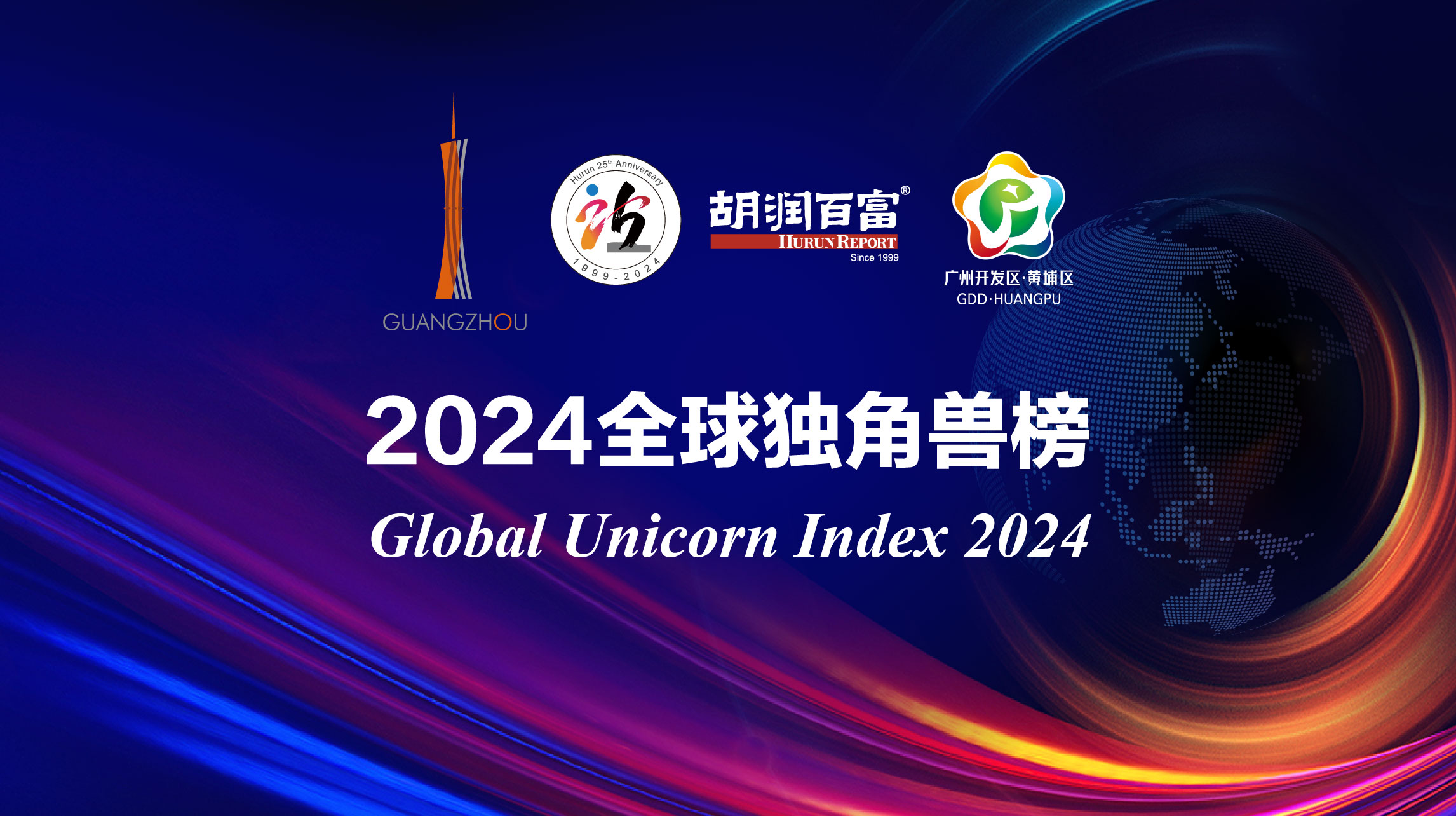
(9 April 2024, Guangzhou, China & Mumbai, India) The Hurun Research Institute today released the Global Unicorn Index 2024, a ranking of the world’s start-ups founded in the 2000s, worth at least a billion dollars and not yet listed on a public exchange. The cut-off was 1 January 2024, with significant changes in valuation updated up to the date of release. Hurun Research has been tracking unicorns since 2017. This is the sixth year of the Global Unicorn Index.
This report includes the Most Successful Unicorn Investors in the World 2024, a ranking of the most successful unicorn investors, based on the number of unicorns they have invested in.
Hurun Research found 1,453 unicorns in the world, based in 53 countries and 291 cities. 430 unicorns saw their valuations rise, of which 171 were new faces. 170 saw their valuations drop, of which 42 were ‘demoted’ as their valuation no longer made the cut of US$1bn. 37 were ‘promoted’ out of the list, of which 29 went IPO and 8 were acquired. 895 saw no change to their valuations. Their total value was US$4.6tn.
The world’s unicorns are disrupting financial services, business management solutions and healthcare. 78% sell software and services, led by FinTech, SaaS and AI, whilst 22% have a physical product, led by New Energy, Biotech, F&B and Semiconductors.
Hurun Report Chairman and Chief Researcher Rupert Hoogewerf said: “The world has minted one unicorn every two days over the last year to take the total of known unicorns in the world to a new record of just under 1500. Despite the slowdown of the economy, China still managed to keep up with the US in terms of new unicorns, each minting more than one unicorn a week for every week of the year.”
“A key feature of the Global Unicorn Index is that it is compiled using data from the world’s leading investors, the ‘entrepreneurs behind the entrepreneurs’, making this the most comprehensive list of the world’s unicorns.”
“The Global Unicorn Index 2024 is designed to give an insight into the economy of tomorrow, by listing out the world’s most successful startups. The sectors they are in and the countries and cities they are based in give an indication into which sectors are attracting the world’s top young talent and smartest capital, and which countries and cities have the best start-up ecosystems.”
“The last five years have been a golden era for entrepreneurship. We have seen the biggest explosion of new technologies coming to market that the world has ever known. Since 2019, the number of unicorns has tripled from 494 to 1453. Whilst the US is leading the way with half of the world’s known unicorns, the number of countries with at least one unicorn has more than doubled from 24 to 53 and the number of cities with at least one unicorn has grown from 118 to 291.”
“The world can now be split into three when it comes to unicorns: the US, China and ‘Rest of the World’. The US has half of the world’s known unicorns, led by SaaS, FinTech and AI, China a quarter, led by AI, Semiconductors and New Energy, while the Rest of the World has the other quarter, led by FinTech and E-commerce.”
“The most active city for unicorns outside of the US and China was London, followed by Bengaluru, Paris and Berlin.”
“This has been the year of AI. OpenAI led the way, adding US$80bn of value to be worth US$100bn today. In China, one-year old Beijing-based Moonshot AI and two-year old Shanghai-based MiniMax are leading the way for ChatGPT-like products. Others include Atlanta-based OneTrust, that uses AI for data security, UK-based Graphcore, that highlights the global race towards computational capabilities and India-based Glance, that showcases the impact of AI in transforming content consumption on mobile platforms.”
“The total value of the world's unicorns reached US$5 trillion, equivalent to the GDP of Japan, meaning that investors expect these unicorns to generate US$5 trillion of profits over the next ten or so years. This shows how startups are shaping the economy of the future.”
“India’s start-up ecosystem has slowed, with the number of unicorns down for the first time since the launch of our list and despite the recent stock market record highs. One factor is that Indian founders produced more offshore unicorns than any other country, co-founding 109 unicorns outside of India compared with just 67 in India. Of the unicorns founded outside of India, significantly all were in the USA (95), led by the Bay Area, with 4 in the UK, 3 in Singapore and 2 in Germany.”
“Despite its stock markets’ poor performance, China nevertheless trailblazed when it came to unicorns going public, with 18 of the 29 unicorns that went public this past year, far ahead of the US with 5 and the Rest of the World with 6.”
“Why are there more and more unicorns? One reason is that they find it hard to go public, which means that some unicorns are likely to end up like the ‘bridesmaid that never gets to be a bride’. ”
“FinTech, SaaS and AI are the three main sectors of unicorns. AI overtook E-commerce to break into the Big Three. Financial services and business management solutions are being most disrupted by unicorns.”
“The world’s most successful unicorn investors, led by Tiger Global, Softbank and HongShan, highlight the symbiotic relationship between startups and strategic investment. This year has seen a slowdown in new unicorn investments, especially compared with the heyday of 2021 as exits prove harder to come by. Ironically, the record-breaking stockmarkets in the US, India and the UK have not delivered significant unicorn IPOs.”
“The World’s 10 most valuable unicorns made up half of all new value increases, led by OpenAI, up US$80bn in value to US$100bn and SpaceX, up US$43bn to US$180bn.”
“Perhaps 5% of the Global Unicorns Index are spinoffs from a larger company, with the core business a startup in the 2000s. The biggest example is fintech Ant Group, which was a spin off in 2004 of the online payments business Alipay from the much bigger Alibaba Group. Others include several of the EV makers, incubated and then spun off from the traditional car manufacturer. Most of these spinoffs are from China.”
“33 of the 171 new unicorns, roughly one in five, came from previous years’ Hurun Future Unicorns Indices, either from Hurun Gazelles, most likely to go unicorn within three years, or Hurun Cheetahs, most likely to go unicorn within five years. In China, 14 of the 56 new unicorns, one in four, came from the Hurun Future Unicorns Index. In India, all the new unicorns came from Hurun Future Unicorn Index. Hurun is proud to have grown to become the world’s largest compiler of lists for unicorns and future unicorns in the world.”
“I hope this list of the world’s unicorns can inspire individuals to drive value creation in new sectors and for countries and cities to recognise the importance of unicorns to their future economy. Yes, some will fail, and when they do it is normally to massive media attention, such as India education platform BYJU, but on the whole unicorns are seen as inherently vital to the new economy.”
“8 unicorns have already made it into the Hurun Global 500, becoming one of the 500 most valuable companies in the world: ByteDance, SpaceX, Shein, Stripe, WeBank, Databricks, OpenAI and Ant Group.”
“The average age of unicorns in the Global Unicorn Index is ten years, suggesting that if you were to start up a business today, you should aim to ‘go unicorn’ by 2034. The average age of a unicorn founder is 45 years, meaning they started out on their unicorn when they were 35.”
“Serial founders are on the up, since they have the experience of running a business, building a team, attracting investors and thinking big. It is critical to a thriving startup ecosystem to encourage these people to live there. Best-known serial founders include the likes of Elon Musk, who owns or co-founded five unicorns on this year’s list: SpaceX, OpenAI, X, The Boring Company and Neuralink. Others include Liu Qiangdong of fintech platform JDT, JD Property and JD Mro, and Travis Kalanick formerly of Uber and now CloudKitchens.”
“The EU underperforms when it comes to unicorns. Its 27 members have only 109 or 8% of the world’s unicorns between them, led by Swedish battery maker Northvolt and German SaaS platform Celonis. This is significantly less than the EU’s 15% contribution to world GDP.”
“While Singapore has grown to become a unicorn powerhouse, becoming the world’s fastest-growing city for unicorns after San Francisco this year, the rest of SE Asia, with its population of over 1 billion, underperforms when it comes to unicorns.”
“Some regions like the Gulf States, are strong in their traditional sectors of energy and real estate but underperform when it comes to unicorns. There are only three unicorns in the Gulf, all in the UAE, with none in the economic powerhouse of Saudi.”
“Some 150 countries in the world have no unicorn, led by Saudi Arabia, Poland, Bangladesh, Iran and Pakistan. For the first time, Hurun Research found unicorns in Russia and South Africa.”
“Hurun is committed to promoting entrepreneurship and value creation through lists and research. Hurun’s ‘startup series’ has four main components. It begins with the Hurun Uth series, listing the top founders under the ages of 30, 35 and 40. Next up are two ‘future unicorn’ lists: Hurun Cheetahs, most likely to ‘go unicorn’ within 5 years and currently with a valuation of between US$300 million and US$500 million, and Hurun Gazelles, most likely to ‘go unicorn’ within 3 years and currently with a valuation of between US$500 million and US$1 billion. The Global Unicorn Index is the pinnacle of the world’s start-ups.”
“Hurun is delighted to be co-hosting the third annual Global Unicorn CEO Conference in Guangzhou starting today, with founders from over 100 unicorns represented. The breakout sessions this year include New Energy and Decarbonisation, AI and New Productive Forces, Biotech and Healthcare, Platform Economies and Going Global.”
Guangzhou Development District/Huangpu District official said, “We are pleased to see the Global Unicorn CEO Conference is being held in our district for the third consecutive year. Guangzhou Development District/Huangpu District will continue to provide the best environment and services for Cheetahs, Gazelles, and Unicorns, by following the highest standards. In February this year, the district launched its ‘Global Investment Promotion Year’ to promote the mutual strengthening of industries and technologies and develop new quality productive forces, with a focus on competitive, strategic emerging and future-oriented industries.”
The head of the Guangzhou Municipal Commerce Bureau commented, “Last year, Guangzhou constantly promoted innovation-driven development and accelerated the cultivation of new quality productive forces, closely focusing on the city’s positioning as the educational and cultural center of science and technology and the significant carrier of international science and innovation center. To date, Guangzhou boasts 24 global unicorn companies, with industrial investment and investment in technological transformation and upgrading both exceeding a remarkable 20% growth rate. Additionally, Guangzhou serves as a hub of university and college students as well as skilled talents, with major national platforms and other innovative resources clustering in the city. Notably, Guangzhou ranks eighth globally in the ‘Nature Index Science City’ ranking. According to the annual business environment survey by the American Chamber of Commerce in the People's Republic of China (AmCham China), Guangzhou is frequently rated as one of the preferred destinations for future investment in China. In the ‘2024 Special Report on the State of Business in South China’ by the American Chamber of Commerce in South China, Guangzhou has been listed as the most popular investment city for the seventh consecutive year. Unicorn companies are leaders in fostering new quality productive forces. We are committed to creating a friendly business environment for industries, enterprises, and entrepreneurs, and extend a sincere invitation to global unicorn companies to settle in Guangzhou for further development.”
Top 10 Unicorns in the World
The cut-off to make the Top 10 was US$33bn, up US$6bn. This year’s Top 10 made up 18% of the total value of the world’s unicorns.
China and USA each had four of the Top 10, with 1 in both of Australia and Malta.
The Top 10 added US$198bn, making up 45% of all the new value added in the year.
There were three new faces: San Francisco-based OpenAI, Australia-based Canva and Malta-based Binance, at the expense of Telegram and Revolut, which dropped down to the Top 30, and Cainiao, which dropped down to the Top 50.
Table 1: Global Unicorn Index 2024 TOP 10
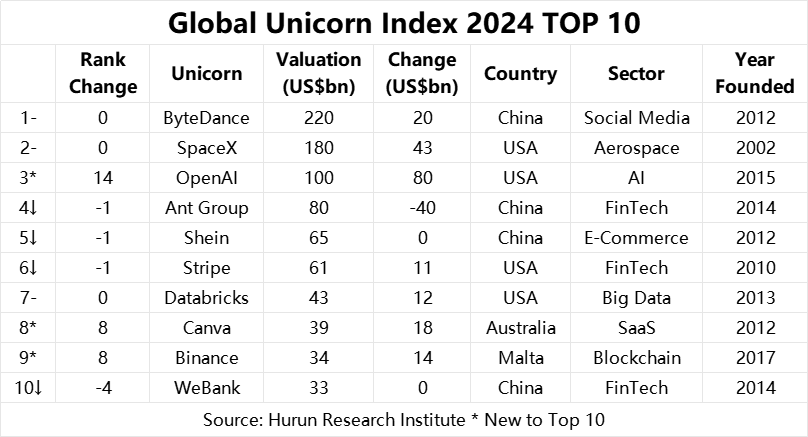
Founded in 2012, Beijing-based ByteDance is officially the world’s most valuable unicorn for the third year running with a value of US$220bn. In 2023, ByteDance's revenue hit US$110 billion, surpassing Tencent in the process, highlighting its e-commerce capabilities, even in the face of political headwinds.
LA-based SpaceX shot up US$43bn in value to retain second place with US$180bn. This past year has seen SpaceX continue to expand its satellite global coverage and reduce cellular dead zones. SpaceX has completed its third Starship test flight.
The best-performing unicorn in the world in the last year was OpenAI, which added US$80bn to its valuation to a total of US$100bn and a Top Three spot in the world, as it managed to productise ChatGPT and launch Sora, heralding the dawn of a new AI era.
Hangzhou-based Ant Group dropped down one place to fourth, as it shed a further US$40bn in valuation to US$80bn. Ant Group’s recent quarterly profits were down 82%, on the back of lower valuations of overseas investments.
Guangzhou-founded fast fashion brand Shein dropped down one place to fifth with a valuation of US$65bn. Shein’s profits doubled to US$2bn, on sales of US$45bn last year, according to the Financial Times.
San Francisco-based payment solutions platform Stripe was down one place to 6th, despite its valuation up US$11bn to US$61bn. Stripe’s profits hit US$200 million for the first three quarters.
San Francisco-based data and AI company Databricks was up US$12bn to US$43bn. Databricks secured a further US$500 million in funding and reported earnings of US$1.6bn for the year ending 31 January 2024, up 50% compared to the previous year.
Canva stormed into the Top 10, up 8 places, as its valuation doubled to US$39bn on the back of a surge in its workplace user base. Canva staff and early investors are poised to benefit as approximately US$1 billion in privately held shares are expected to be sold in a secondary market transaction.
Cryptocurrency exchange Binance was up US$14bn to a valuation of US$34bn and a Top 10 spot, despite a US$4.3 billion fine in the US. Founder Zhao Changpeng resigned as CEO after pleading guilty to not maintaining an effective anti-money laundering program. Binance had revenues of US$12bn in 2022, according to Fortune.
Tencent-backed digital bank WeBank remained in the Top 10, down 4, with a valuation of US$33bn. Founded in 2014, WeBank has grown to have US$310bn of assets under management.
Where are the World’s Unicorns based?
The world’s unicorns come from 53 countries, up from 48 last year, spread around 291 cities, up from 271. USA led with 703 unicorns, followed by China with 340.
India was third with 67 unicorns, led by on-demand delivery start-up Swiggy and fantasy sports platform Dream11 worth US$8bn each, and Razorpay worth US$7.5bn.
Thailand, Seychelles, Italy and Greece broke into the Top 30 countries.
By city, San Francisco retained the title of ‘World Unicorn Capital’ with 190 unicorns. Singapore was the fastest-growing city in the world for unicorns after San Francisco, adding 8 in the year to take its total to 17.
Table 2: Countries and cities where the world’s unicorns are based

A comparison of the US, China and Rest of the World
The main sectors of US-based unicorns were SaaS, FinTech and AI, for China it was AI, New Energy and Semiconductors, whilst for the Rest of the World, it was FinTech and E-commerce.
London and Bengaluru led the cities from the ‘Rest of the World’ with the most unicorns, followed by Paris, Berlin, Singapore and Tel Aviv.
The fastest-growing cities in the US by number of unicorns were San Francisco and New York; in China it was Hefei, followed by Guangzhou, Hangzhou, Suzhou and Nanjing; whilst for the ‘Rest of the World’, it was Singapore and London.
Table 3: Top Industries for Unicorns in the USA, China & Rest of World

What industries do they come from?
FinTech, SaaS and AI accounted for one-third of all unicorns on the list. AI overtook E-commerce to third place.
Industries that have been most disrupted by unicorns in the past year were Financial Services, Business Management Solutions, Healthcare and Retail.
Table 4: Core Industries of the Unicorns
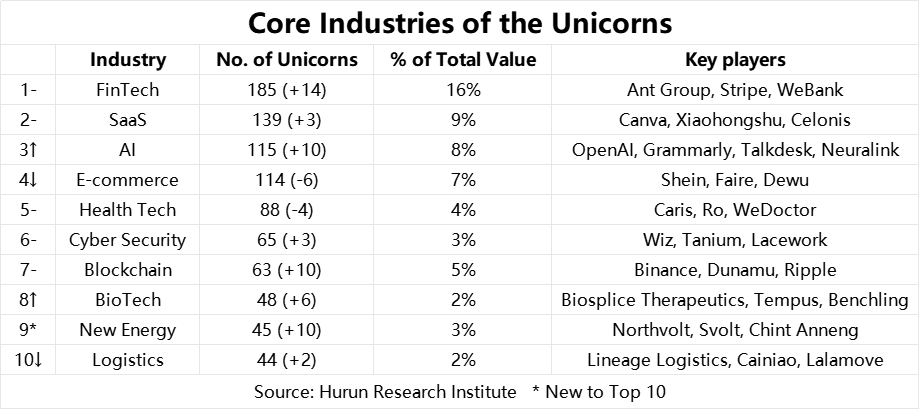
Who’s Up?
430 unicorns saw their valuation increase, of which 171 were new unicorns. The valuation increases and new unicorns came to US$756bn, of which new unicorns made up US$310bn.
The new unicorns came from the US (70) and China (56). The Rest of the World only managed 45 new unicorns between them.
The sectors that performed best were FinTech, AI, Blockchain and New Energy. Others of note included SaaS, E-commerce, Semiconductors and Biotech.
By city, San Francisco led with 17 new unicorns, followed by NYC 14, Shanghai 10, Singapore and London with 7 each, and Guangzhou and Beijing with 6 each.
Of the 37 promotions out of last year’s Global Unicorn List, China led with 18, all IPOs, whilst the USA had 11, of which 5 were IPOs and 6 acquisitions.
Renewable Energy. China dominated with over half of the renewable energy related unicorns. Sweden-based Lithium battery maker Northvolt added US$8bn to take its valuation to US$20bn. China-based rooftop solar panel maker Chint Anneng was up US$4bn to US$8.5bn. Shanghai-based EV maker IM Motors, a joint venture between Alibaba and a large state-owned car maker, made the list for the first time with a valuation of US$4.2bn, and Xiamen-based new energy storage battery Hthium also made the list for the first time with US$1.4bn.
Semiconductors. China dominated with over 80% of semiconductor-related unicorns, with only the US, Israel and the UK also featuring in this sector. Beijing-based car chip specialist Horizon Robotics added US$5.2bn to take its valuation to US$8.7bn and become the most valuable semiconductor unicorn in the world. Shenzhen-based Jialichuang was up US$3.1bn to US$8.5bn. Hefei-based memory storage developer Changxin Xinqiao shot into the list with a valuation of US$5.6bn.
Aerospace. While SpaceX is the clear leader for space-related unicorns, others of note include Jeff Bezos-backed Blue Origin, worth US$20bn, which made the list for the first time, Sierra Space worth US$5.3bn and Relativity Space worth US$4.2bn. Over a third of the aerospace unicorns were from China, mainly sending satellites into space, including Beijing-based Galactic, Changchun-based Chang Guang and Wuhan-based CASIC.
Blockchain. Crypto exchanges led the valuations. Binance led the way with a valuation of US$34bn, and South Korean crypto currency exchange Dunamu saw its valuation rise US$5 billion to US$11bn.
Social Media. ByteDance was the absolute leader, followed by Dubai-based Telegram worth US$30bn. Elon Musk’s X joined the list at a valuation of US$12.5bn, significantly less than the price Musk paid in October 2022. Others of interest included consumer media platforms Xiaohongshu worth US$14bn, Fort Mill-based Red Ventures, which added US$10bn to take its valuation to US$11bn and Reddit worth US$10bn. Donald Trump’s social media platform Truth Social made the list for the first time with US$3bn.
Online Gaming. Mihoyo was one of the Top 5 risers, as the Shanghai-based mobile gaming platform surged US$15.8bn in value to US$23bn. Another gaming company, South Korea-based Haegin was up US$7bn to a valuation of US$8bn.
F&B. China led the way for F&B-related unicorns. Drinks brand Genki Forest was worth US$10bn and coffee chain Luckin Coffee added US$1.8bn to a valuation of US$7.6bn. Bubble tea brands continued from strength to strength with Zhengzhou-based MXBC worth US$9.4bn, Shenzhen-based HeyTea worth US$5bn and Chengdu-based Chabaidao making the list for the first time with US$2.5bn. US-based Impossible Foods was up US$1.8bn to US$7.6bn.
Table 5: Top 10 biggest rises in valuations in one year
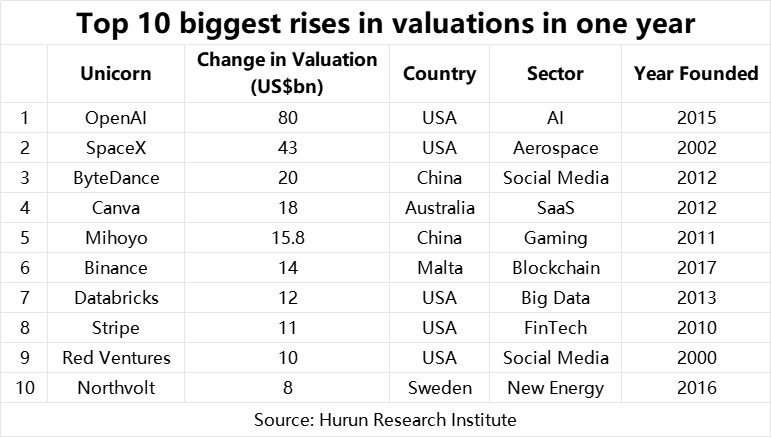
Table 6: Top 10 new faces
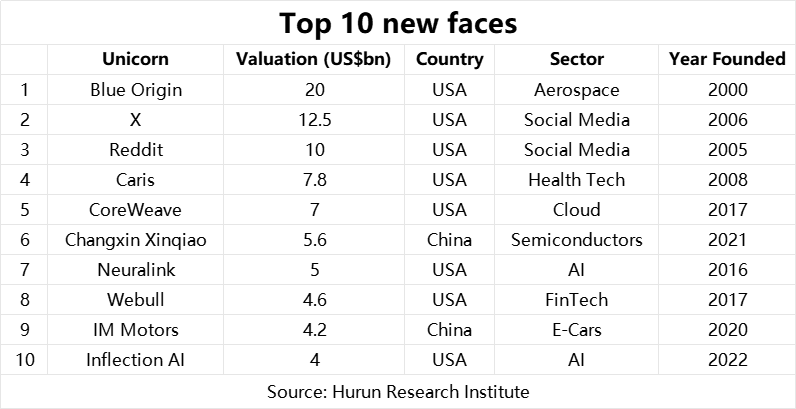
Unicorns gone IPO or acquired
37 unicorns from last year were ‘promoted’ out of the Global Unicorn Index, of which 29 went IPO and 8 were acquired.
China led the IPOs with 18 of the 29, followed by the US with 5.
The best-forming unicorn IPO was Indonesia-based J&T Express, which grew on the back of a partnership in China with Pinduoduo. Others that did well were several China-based companies including smart device maker Huaqin, car maker Lotus, solar panel maker CSI Solar and robotics maker Ubtech.
One unicorn saw its market cap drop below US$1bn, New York based mortgage origination and services provider Better.com.
Table 7: Top Unicorn IPOs of Last Year
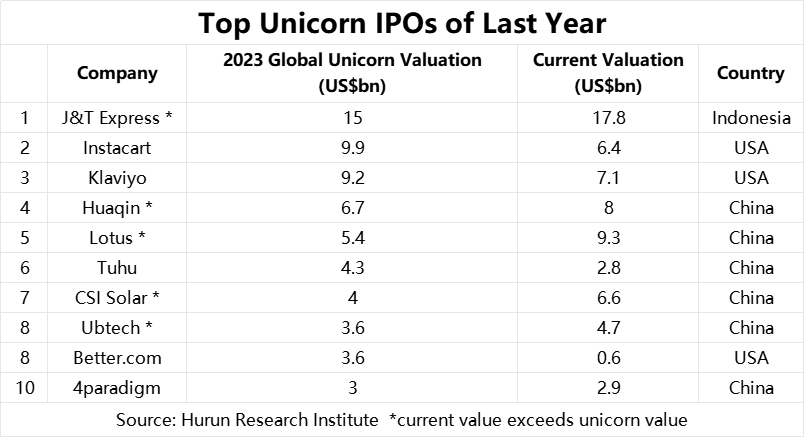
And, Who’s Down?
128 unicorns from the last year saw their valuation drop, losing US$210bn in the year. The Top 10 biggest losses in value over the year accounted for over half the total value lost in the year.
A further 42 unicorns from last year dropped out of the list completely, as their valuations fell below US$1bn. 21 of the drop offs were from the USA and 11 from China.
FinTech, SaaS and E-commerce were the sectors most affected.
18 FinTech unicorns dropped in value, the most of any sector. Ant Group led with a US$40bn drop in valuation, on the back of continued regulatory pressures. UK-based Revolut and Germany-based N26 were down US$10bn and US$6.2bn respectively, as competition intensified from both startups and established financial institutions. Others down include UK-based SumUp and US-based Chime.
SaaS followed with 11 unicorns, as the market matured and competition intensified.
E-commerce also saw 11 unicorns decline in value, reflecting the challenges of sustaining growth post-pandemic and adjusting to a new consumer behaviour landscape.
Health Tech and Logistics also face downward pressures, with 9 and 8 companies respectively witnessing valuation drops. China-based logistics provider Cainiao was down US$16.5bn, as it announced a further delay to its IPO.
Blockchain saw a number of companies drop, most notably NFT marketplace OpenSea, down US$11.7bn to just US$1bn on the back of a cooling off of the hype around NFTs
Others of note included China drone maker DJI, down US$6.5bn as it further delayed its IPO.
Byju's dropped off the list as it restructured operations and cut costs after increasing losses. The former unicorn missed its revenue target for the financial year ending in March last year and is working to resolve a US$1.2 billion debt.
Table 8: Top 10 unicorns with biggest drops in valuations
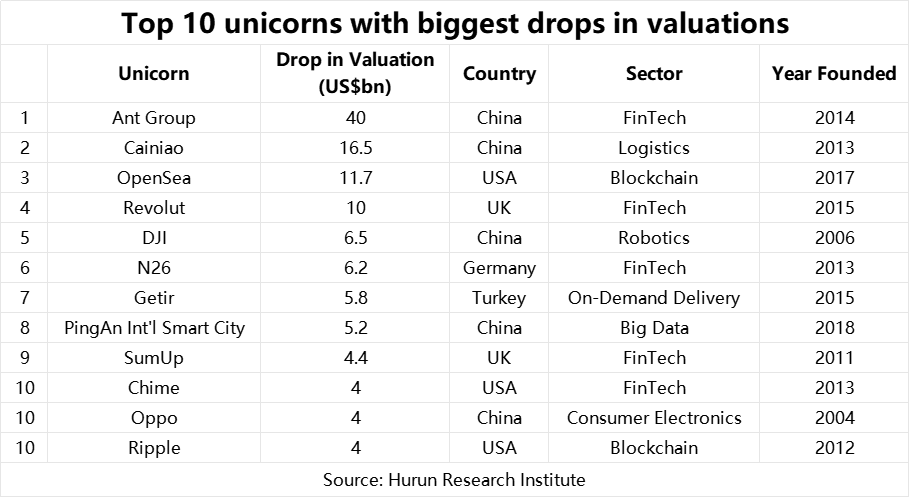
Table 9: Top 10 biggest dropouts in last year
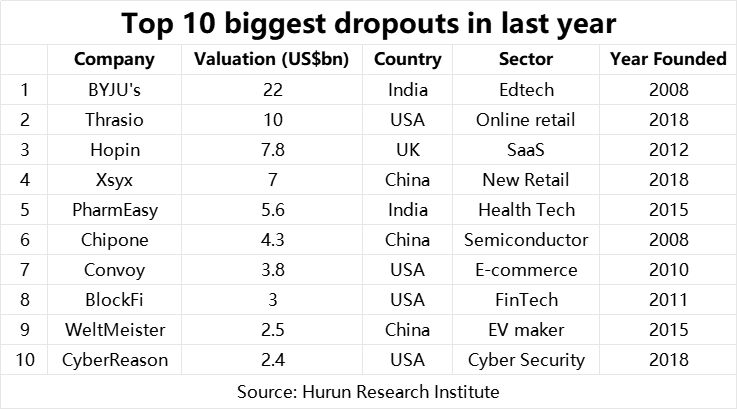
Which investors are the best at finding Unicorns?
Tiger Global, under the leadership of Scott Shleifer and Chase Coleman, took the title of the ‘World’s Most Successful Unicorn Investor’ for the first time, investing into 205 unicorns. SoftBank, under Masayoshi Son, was second with 169 unicorns, followed by HongShan, which, under Neil Shen, made history as it overtook Sequoia, historically a titan in the field.
Sequoia dropped down to fourth, after carving out its Chinese and SE Asia & India operations. Sequoia’s Chinese partnership rebranded as HongShan, whilst its SE Asian and Indian partnership rebranded as Peak XV and also made the Top 50. Andreessen Horowitz, also known as A16Z, under Ben Horowitz, was fifth.
For the full index of the Most Successful Unicorn Investors in the World 2024, see Appendix 1.
Table 10A: Most Successful Unicorn Investors Top 10
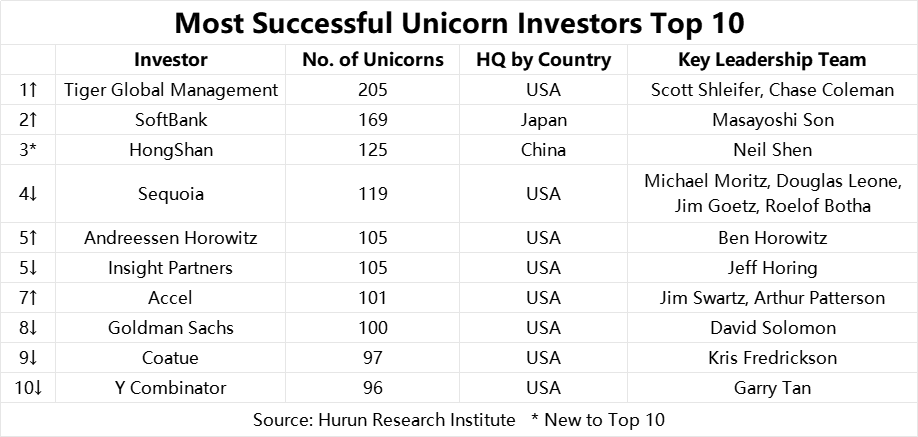
Table 10B: Most Successful Investors into China Unicorns – Top 30
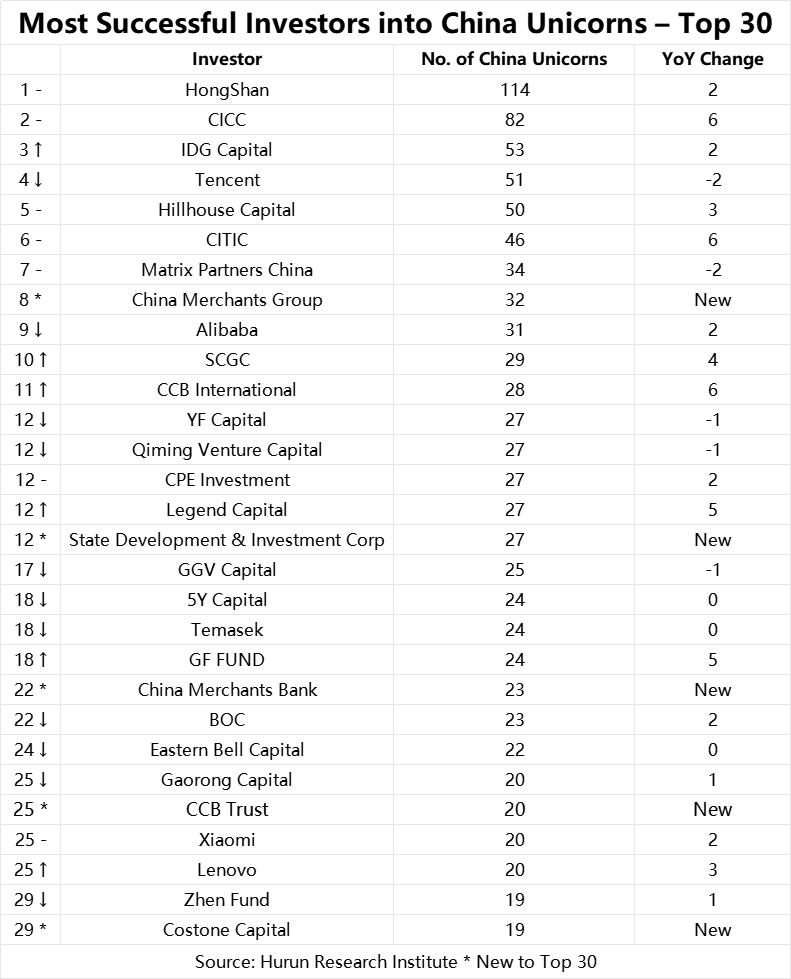
Comparison between Cheetahs, Gazelles, Unicorns and Global 500
Cheetahs are start-ups founded in the 2000s, not yet listed on a public exchange and most likely to ‘go unicorn’ within five years. Gazelles are start-ups founded in the 2000s, not yet listed on a public exchange and most likely to ‘go unicorn’ within three years. The Hurun Global 500 is a list of the 500 most valuable non state-controlled businesses in the world.
The pipeline for the Hurun Global 500 is the Global Unicorn Index, the pipeline for the Global Unicorn Index is the Hurun Global Gazelle Index and the pipeline for the Hurun Global Gazelle Index is the Hurun Global Cheetah Index.
China and India have a higher percentage of Cheetahs, Gazelles and Unicorns, which over the course of the next five years ought to translate into a higher percentage of Hurun Global 500s. In the same way, the US, Japan, France, Switzerland and Canada have a smaller percentage of start-ups, which suggests they will lose ground in the Hurun Global 500.
By city, San Francisco, Shanghai, Beijing, Shenzhen and Bengaluru have more start-ups and ought to have more Hurun Global 500s within five years. Tokyo and Paris have less startups, so are likely to see their percentage of the world’s most valuable companies go down. London seems to be stable.
By industry, healthcare and business management solutions ought to grow into Hurun Global 500 companies.
Companies selling B2B and software & services are on the up.
Table 11A: By Country comparison of Cheetahs, Gazelles, Unicorns and 500 Most Valuable Cos
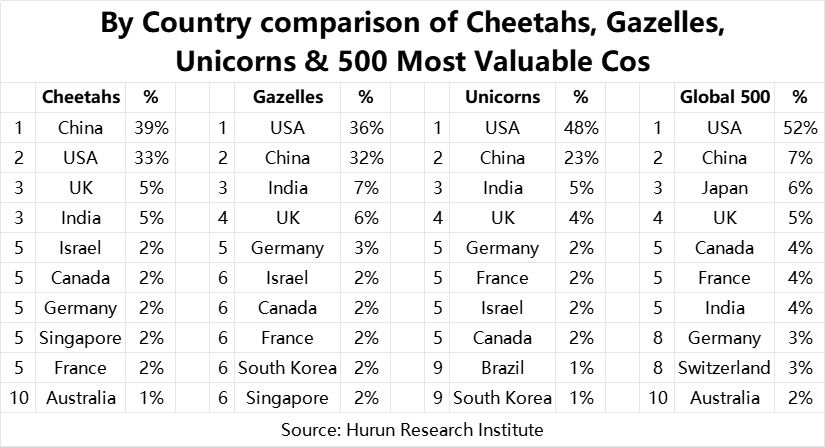
Table 11B: By Industry comparison of Cheetahs, Gazelles, Unicorns and 500 Most Valuable Cos
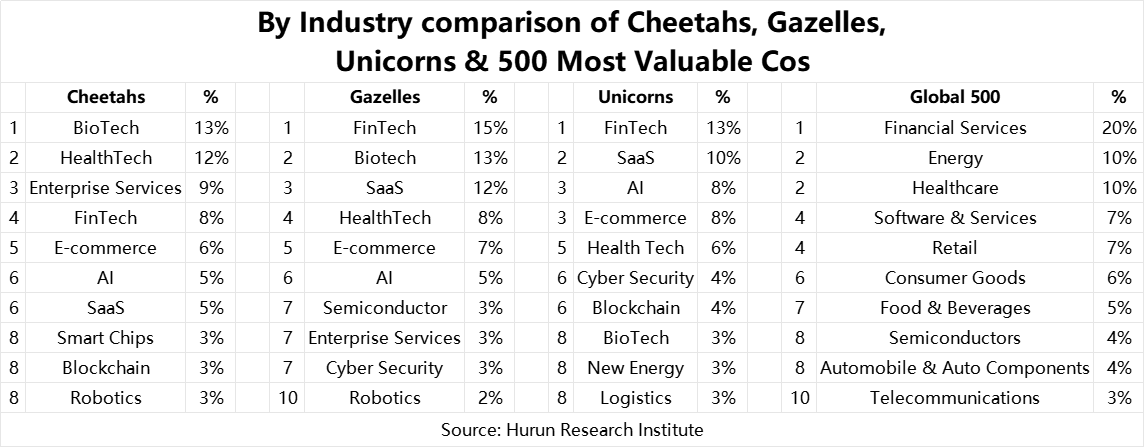
Table 11C: Comparison between Cheetahs, Gazelles, Unicorns and Global 500
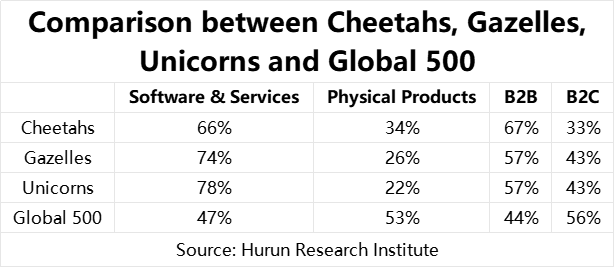
Key Statistics
Table 12A: Key Statistics
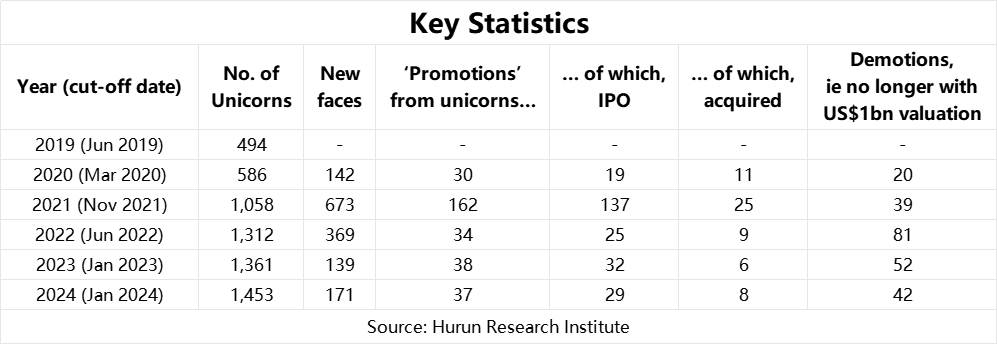
Table 12B: Key Statistics for China
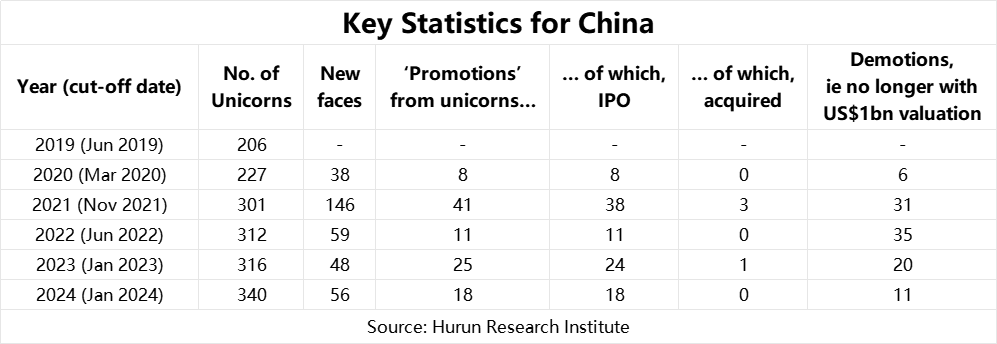
Methodology
The Global Unicorn Index is compiled by the Hurun Research Institute, and includes companies founded in the 2000s with a current valuation of US$1bn, not yet listed on a public exchange.
Cut-off for this year’s index was 1 January 2024, with significant valuation changes updated up to the date of release.
Many of the world’s top investment houses provided details of their portfolio, which the Hurun Research team cross-checked against specialized investment databases, industry experts, media sources, as well as unicorn co-founders.
Valuing unicorns can be tricky. The very nature of these super-fast-growing companies makes valuations hard to pin down, but to ensure consistency of the valuations, Hurun Research used the most recent valuation based on a sizeable round. Where it becomes harder is when a unicorn is underperforming or on its way down, since it is unlikely to have a new round of investment at a valuation lower than the previous round. In this case, Hurun Research used industry comparatives to ascertain a new lower valuation.
Countries and cities are ranked according to the unicorn head office.
Unicorns leave the Global Unicorn Index either by being ‘promoted’, ie by listing on a public exchange (IPO) or being acquired, or by being ‘demoted’, when their value drops below US$1bn.
Hurun Research has been tracking unicorns since 2017.
Disclaimer. All the data collection and the research has been carried out by Hurun Research. This report is meant for information purposes only. Reasonable care and caution have been taken in preparing this report. The information contained in this report has been obtained from sources that are considered reliable. By accessing and/or using any part of the report, the user accepts this disclaimer and exclusion of liability which operates to the benefit of Hurun. Hurun does not guarantee the accuracy, adequacy or completeness of any information contained in the report and neither shall it be responsible for any errors or omissions in or for the results obtained from the use of such information. No third party whose information is referenced in this report under the credit to it, assumes any liability towards the user with respect to its information. Hurun shall not be liable for any decisions made by the user based on this report (including those of investment or divestiture) and the user takes full responsibility for their decisions made based on this report. Hurun shall not be liable to any user of this report (and expressly disclaim liability) for any loss, damage of any nature, including but not limited to direct, indirect, punitive, special, exemplary, consequential losses, loss of profit, lost business and economic loss regardless of the cause or form of action and regardless of whether or not any such loss could have been foreseen.
About Guangzhou
Guangzhou, a national central city, the core engine for the development of the Guangdong-Hong Kong-Macao Greater Bay Area, the capital of Guangdong Province, a national famous historical and cultural city, a modern city with oceanic characteristics, an integrated international transportation hub, and a technological, educational, and cultural center, has always been on the list of the world’s first-tier cities in recent years and is the “southern gate” of China.
Millennium commercial capital
With its sustained flourishing maritime trade, Guangzhou has been a commercial city and a water transportation hub in China since the Qin and Han dynasties. Guangzhou became the main port for the Maritime Silk Road from the 230s onwards, the largest port in China during the Tang and Song dynasties, and China’s only port for international trade during the Ming and Qing dynasties. It is the only port for international trade in China that has never been closed, hence known as the “millennium commercial capital”.
Size of economy
In 2023, Guangzhou registered a GDP of 3.04 trillion yuan, an increase of 4.6%, accounting for 2.4% of the country’s total and 22.4% of Guangdong Province’s and ranking the fourth among cities in China. For three consecutive years, Guangzhou’s total retail sales of consumer goods and the total value of import and export of commodities have both exceeded 1 trillion yuan, making Guangzhou the third city in China with both domestic and foreign trade exceeding one trillion yuan. Fixed asset investment in Guangzhou has exceeded 860 billion yuan. In January and February 2024, the city’s total retail sales of consumer goods amounted to 202.409 billion yuan, a year-on-year increase of 6.5%. The total value of Guangzhou’s international import and export trade amounted to 163.716 billion yuan, a year-on-year increase of 9.2%.
Industrial hub
As a national advanced manufacturing base, an international commercial center, and one of the first international consumption central cities, Guangzhou boasts six advanced manufacturing clusters with an output value of more than one hundred billion yuan and seven service industries with an added value of more than one hundred billion yuan. In January and February 2024, Guangzhou’s industries above the designated size realized an added value of 68 billion yuan, an increase of 7%. The added value of the high-tech manufacturing industry increased by 18.2%. That of the pharmaceutical and electronic & communications equipment manufacturing industries increased by 16.0% and 22.5% respectively, and the ultra-high-definition video & next generation display industry by 25.5%. The production of medical instruments, equipment, and apparatus increased by 46.0%, that of analog chips doubled, and that of industrial robots and service robots increased by 79.3% and 1.1 folds respectively.
Science and technology innovation hub
Guangzhou is an important carrier of the international science and technology innovation center, hosting national major projects such as the Guangzhou Laboratory, the Greater Bay Area National Center of Technology Innovation, the Cold-seep Ecosystem, and the Human Cell Lineage Facility. With two national manufacturing innovation centers for new display and new energy storage, two national industrial innovation centers for nano-intelligent manufacturing and advanced polymer materials, as well as a disruptive technology innovation center, a future industrial science and technology park for biopharmaceuticals and new mobility, 10 national key laboratories, etc., Guangzhou is the only city in China that houses national laboratories, comprehensive national technological innovation centers, national significant scientific and technologic facilities, international big science programs, and other key national platforms. Guangzhou is home to 13,000 high-tech enterprises, 21,000 small and medium-sized tech enterprises, and 22 global unicorn companies. With the R&D investment intensity reaching 3.43%, it ranks the 8th in the world in the Nature Index-Science Cities.
Talent hub
With 84 colleges and universities, Guangzhou has 1.65 million college students, which ranks first in the country. The total number of junior college and above talent resources is 5.1 million, ranking the third in the country. There are 135 academicians from the Chinese Academy of Sciences and the Chinese Academy of Engineering and from developed countries working in Guangzhou. The city’s foreign talent attractiveness ranks among the top three in the country.
Preferential policy hub
The state has clearly specified the mission of building Nansha, Guangzhou into a major strategic platform based in the GBA, collaborating with Hong Kong and Macao, and oriented to the world with the policies of the Guangdong-Hong Kong-Macao Greater Bay Area and Free Trade Zone. Guangzhou has three major national economic and technological development zones (Guangzhou Economic and Technological Development Zone, Nansha Economic and Technological Development Zone, and Zengcheng Economic and Technological Development Zone), four national comprehensive bonded zones (Baiyun International Airport Comprehensive Bonded Zone, Huangpu Comprehensive Bonded Zone, Nansha Comprehensive Bonded Zone, and Guangzhou Knowledge City Comprehensive Bonded Zone), and state-level development platforms including Sino-Singapore Guangzhou Knowledge City, Guangzhou Airport Economic Demonstration Zone, and Artificial Intelligence and Digital Economy Pilot Zone.
Optimal business environment
Guangzhou has implemented six iterations of business environment reforms so as to create an “industry-friendly”, “enterprise-friendly”, and “entrepreneur-friendly” business environment. With the best government service hotline in the country, innovative practices, such as service trade innovation and application of credit commitments, selected as the best practice cases country-wide, and the government website performance evaluation ranking first among other provincial capital cities, Guangzhou ranks among the top in the country in terms of government transparency, rule-of-law government assessment, and digital government service capabilities, attracting more than 3.4 million market entities to take root here as well as more than 40,000 foreign-funded enterprises and 345 of the Fortune 500 companies to settle in the city.
Canton Fair (China Import and Export Fair)
Launched in 1957 and held every spring and autumn, Canton Fair is China’s oldest, highest-level, and largest comprehensive international trade event that features the largest varieties of commodities, the largest number of buyers, the largest number of participating countries and regions, and the best transaction results. It is hailed as “China’s first exhibition”. In October 2023, the Phase IV project of the Canton Fair Complex was officially put into use. The 134th Canton Fair attracted overseas buyers from 229 countries and regions, with 197,869 overseas buyers participating offline, a 53.4% increase over the 133rd Canton Fair, and 453,857 overseas buyers participating online.
About Guangzhou Development District/ Huangpu District
Located in the core area of the Pearl River Delta in Guangdong Province, Guangzhou Development District /Huangpu District is known as the "Pearl of the GBA" (Guangdong-Hong Kong-Macao Greater Bay Area), and is one of the first national economic and technological development districts. In 2023, it registered a regional GDP of more than RMB 430 billion and total industrial output of RMB 862 billion, with multiple key economic indicators such as realized FDI ranking top among China's economic development districts, making it Guangzhou's hub of real economy, main engine of sci-tech innovation, and key platform for reform and opening-up.
Guangzhou Development District /Huangpu District is building a strategic space featuring "Three Cities & One Island", namely Knowledge City, Science City, Maritime Silk Road City, and Bio Island. It has established five industrial clusters worth RMB 100 billion in the areas of automobile manufacturing, new display, green energy, new materials, cosmetics & healthcare, as well as three industrial clusters worth RMB 10 billion in the areas of biotech, high-end equipment and integrated circuit. It has ranked among the top three of China's top 100 industrial districts in terms of industrial competitiveness for five consecutive years.
Guangzhou Development District /Huangpu District is among the most popular investment destinations for multinational companies in China, where Fortune Global 500 companies have invested in over 320 projects and more than 80 listed companies are based. The District became the only Chinese winner of the UN Investment Promotion Award in 2019, and has received the Award of National Investment Promotion Agencies and Projects for four consecutive years.
Guangzhou Development District /Huangpu District has outstanding innovation capacity. With the largest incubator cluster in South China, the District has ranked first among China's development zones in terms of sci-tech innovation capability for four consecutive years, as its R&D investment accounts for 6.65% of the district GDP, which is a world-leading level. Boasting strong scientific and technological strengths, the District has attracted more than 20,000 sci-tech enterprises, more than 2,800 national high-tech enterprises, and more than 500 gazelle enterprises in recent years. The number of listed companies based in the District accounts for 2/3 of Guangzhou's total.
Guangzhou Development District /Huangpu District has a large talent pool, encompassing teams led by Nobel Prize Winners and professional teams led by academicians Zhong Nanshan, Wang Xiaodong, Shi Yigong, etc. So far, over 100 academicians and 1,400 high-caliber talents have joined the District, making it a highly attractive destination for talents across China.
Guangzhou Development District /Huangpu District has a robust business environment. Being the only experimental zone for business environment reforms in Guangdong, the District has upgraded its business environment to "version 6.0", rolling out government approval services featuring "acceptance anytime, one visit to complete". Huangpu is the district most favorable to enterprises, as it has been the first in China to set up windows for receipt of policy supports. Policy supports can be gained through one visit within a limited time frame. It only takes 21 working days normally and half a day at the fastest speed. As the only pilot zone for IPR utilization and protection reforms in China, the District is home to over 200 IPR-related agencies such as Guangzhou IP Exchange, and Patent Examination Cooperation Guangdong Center of the Patent Office, CNIPA. Now it has a robust IPR protection system covering justice, mediation, arbitration, administrative law enforcement and speedy rights protection, and a resolution mechanism for diverse IPR disputes.
About Hurun Inc.
Promoting Entrepreneurship Through Lists and Research
Oxford, Shanghai, Mumbai, Sydney, Paris
Established in the UK in 1999, Hurun is a research, media and investments group, promoting entrepreneurship through its lists and research. Widely regarded as an opinion-leader in the world of business, Hurun generated 8 billion views on the Hurun brand last year, mainly in China and India.
Best-known today for the Hurun Rich List series, telling the stories of the economies of China, India and the world through the stories of their most successful entrepreneurs, Hurun’s two other key series include the Hurun Start-up series and the Hurun 500 series, a ranking of the world’s most valuable companies.
The Hurun Start-up series begins with the Hurun U30s, U35s and U40s, awards recognizing the most successful founders under the age of 30, 35 and 40, and is today in five countries. Next up are Hurun Cheetahs, most likely to go unicorn with five years and Hurun Gazelles, most likely to go unicorn within three years. The culmination of the start-up series is the Hurun Global Unicorn Index.
Other lists include the Hurun Highschools List, ranking the world’s best independent highschools, the Hurun Philanthropy List, ranking the biggest philanthropists, the Hurun Art List, ranking the world’s most successful artists alive today.
Hurun provides research reports co-branded with some of the world’s leading financial institutions and regional governments.
Hurun has recently hosted high-profile events across China and India, as well as London, Paris, New York, LA, Sydney, Luxembourg, Istanbul, Dubai and Singapore.
For further information, see www.hurun.net.
For media inquiries, please contact:
Hurun Report
Porsha Pan
Tel: +86-21-50105808*601
Mobile: +86-139 1838 7446
Email: porsha.pan@hurun.net
Grace Liu
Tel: +86-21-50105808
Mobile: +86 136 7195 4611
Email: grace.liu@hurun.net
Global Unicorn Index 2024 TOP 100
For the full index of 1,453 Unicorns, see www.hurun.net

Appendix 1 – Most Successful Unicorn Investors in the World 2024

Appendix 2 – Unicorns founded by Indians outside of India
Table: Unicorns outside of India with an Indian co-founder

Appendix 3 – Unicorns founded by Chinese outside of China
Table: Unicorns outside of China with a Chinese co-founder
